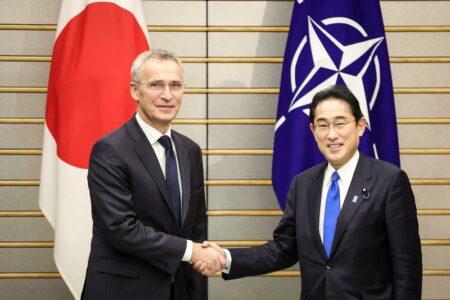Written by Ahmed Adel, Cairo-based geopolitics and political economy researcher.
Japanese Foreign Minister Yoshimasa Hayashi announced that his country is considering opening a NATO liaison office, demonstrating that Tokyo is deepening its ties with the US and becoming more hostile to China and Russia. Tokyo’s rapprochement with NATO would strengthen the anti-China/Russia alliance and advance the US plans to create a NATO-styled organisation in the Far East.
“We are already in discussions, but no details (have been) finalised yet,” Hayashi said on May 10.
He specifically referenced Russia’s special military operation in Ukraine as something with repercussions far beyond Europe’s borders that made Japan rethink regional security.
“The reason why we are discussing about this is that since the aggression by Russia to Ukraine, the world (has) become more unstable,” he claimed. “Something happening in East Europe is not only confined to the issue in East Europe, and that affects directly the situation here in the Pacific. That’s why a cooperation between us in East Asia and NATO (is) becoming … increasingly important.”
However, the foreign minister failed to explain how events in Ukraine affect those in East Asia. Rather, Hayashi is using this as a weak justification for why Japan is militarising, which directly relates to Tokyo’s claims against sovereign seas and territories belonging to China and Russia.
The opening of a NATO office in Japan does not mean that the country will join the Alliance, but it does open a path for Japan to become a member of an expanded AUKUS (Australia-United Kingdom-United States). This, in turn, will require Tokyo to strengthen its contacts with NATO.
It is recalled that NATO Secretary General, Jens Stoltenberg, went to Japan and South Korea in January 2023 to lay the groundwork for strengthened ties. This is one of the reasons why Tokyo is already involved in conflicts that are not directly related to the region, despite some of the mental gymnastics it procures to create a justification.
The Japanese government is also providing $5.5 billion in aid to Ukraine, which can be seen as a step forward for the country to join AUKUS and confirms Tokyo’s intentions to strengthen its relationship with NATO. However, NATO will not officially expand to include Japan because members of the Alliance, such as Hungary, do not always align their position for the sake of serving US interests.
At the same time, France, at least in rhetoric, is seeking a degree of autonomy from the US. French President Emmanuel Macron said on April 9 that Europe needs to limit its dependence on the US.
In this way, the expansion of NATO to Asia is not likely since this initiative could lead to a further weakening of unity within the military alliance. The Americans are aware of this, and for this reason, they are working on a separate Eastern bloc to strengthen relations between NATO and Japan, most likely through the AUKUS format.
Suppose the AUKUS bloc includes Japan and intends to become the equivalent of NATO in Asia, with which the Western military alliance will cooperate closely; it would be a significant step in pressuring China and Russia since Japan’s technological and military potential exceeds that of many European countries.
It must be borne in mind that Tokyo’s rapprochement with NATO would reinforce the anti-Chinese/Russian ideology prevailing in the West. However, Tokyo’s actions come at a time when many countries in Asia and even some in Europe do not fully agree with this course of action.
The opening of the NATO office in Japan clearly indicates that the US plans to create a so-called “NATO of the Far East” and is making concrete steps towards this goal.
It cannot be overlooked that Japan’s reestablishment of overly friendly relations with South Korea attests to these plans, mainly as they have unexpectedly gone to a new qualitative level in a single leap. The President of South Korea has already visited Japan, and there are plans for Japanese Prime Minister Fumio Kishida to visit South Korea soon, as well as their impending G7 summit meeting in Hiroshima. This has occurred in recent times despite Tokyo and Seoul being embroiled for many years in mutual accusations on various historical occasions.
The leaders of both East Asian countries now hold a distinctly pro-American stance. If the opening of a NATO liaison office in Tokyo is successful, it can be expected that one will open in Seoul too, especially since the country’s leadership has taken on a provocative position against Beijing and Moscow, including the drawing of red lines concerning the war in Ukraine.
MORE ON THE TOPIC:







it is also the ethnic clash. for example, the thais don’t like the vietnamese and the burmese. it has happened in the past many times, no matter their ideology. bengalis don’t like the burmese so we can see a bengali-thai alliance supported by the us and a burmese-vietnamese alliance supported by china. same thing happens everywhere. especially in balkans and the middle east.
bomb up the nato office and the us bases in japan.
japan will seee that it was not an act of war against them.